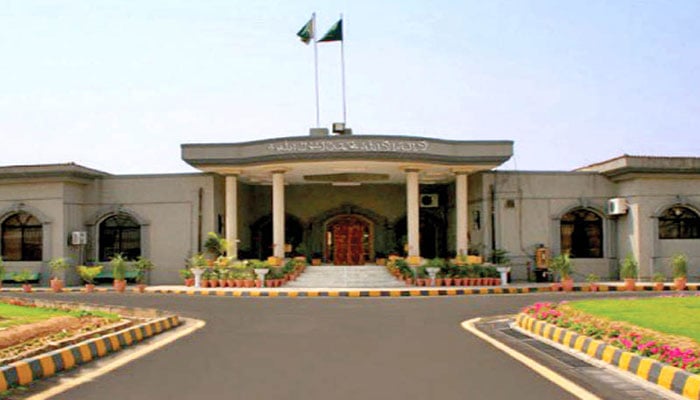End of effective role of 21 advisers, special assistants: New IHC judgment goes a step further
ISLAMABAD: A just-released detailed judgment of a two-judge bench of the Islamabad High Court (IHC) is not only an endorsement of an earlier verdict authored by Chief Justice Athar Minallah in August that practically ended the role of the advisers and special assistants in the government but goes a step further.
An upshot of the ruling is that Prime Minister Imran Khan will now be required to preside over the Economic Committee of the Cabinet (ECC) in his capacity as the finance minister because advisors have been barred from chairing any cabinet committee or being its member.
In the past, the Pakistan People’s Party (PPP) government had overcome a similar constitutional hurdle by electing Hafeez Sheikh as a senator and appointing him the finance minister. All the five advisers and 16 special assistants in the present government have been affected by the judgment, which states that they advise the prime minister but cannot themselves exercise executive authority.
The most high-profile among them are the advisers on finance, parliamentary affairs, commerce and investment, and accountability and the interior. Similarly, the special assistants include those chairing the health ministry, petroleum division, overseas Pakistanis and human resource development ministry, and the establishment division. The 21 advisers and special assistants had been given the status of federal ministers or ministers of state.
Looking at the judgment, legal experts say that the advisers and special assistants are now left with a very limited function to perform. They have no legally backed powers as they cannot exercise any executive authority whatsoever.
Noted lawyer Kashif Malik told The News that the present ruling has gone a step further than the previous verdict. “The judgment noted at more than one place that the advisers and special assistants are not federal ministers or ministers of state but only enjoy ministerial status for the purposes of perks and privileges,” he pointed out.
He said the government, as ordained by the Constitution, is to be run by elected representatives. “The advisers and special assistants did not figure in the definition of the federal cabinet as mentioned in Article 91.” The lawyer said the special assistants don’t find any mention in the Constitution, which only refers to advisers once. He said neither the advisers nor the special assistants can speak on behalf of any ministry or division they are attached to.
Justice Minallah’s ruling said the Rules of Business provide that only ministers and secretaries, as well as authorised officers, will act as official spokespersons of the government. It held that as a corollary, the rules would be breached if an adviser or an authority not specified in them is authorised to act as government spokesperson.
The ruling had explained what an adviser can do and what he can’t, and said a minister defined in the rules neither includes an adviser nor a special assistant. It said that anything done in violation of these binding rules is void and ultra vires. It pointed out that the Supreme Court has also ruled that since the authority of the rules flows from the Constitution, following the scheme prescribed in them is mandatory and binding and a failure to do so would lead to an order or action lacking any legal validity. Rules provide that each division or ministry will consist of a secretary to the government and of such other officials subordinate to him as the government may determine.
The judgment had said that appointing an adviser with the status of a minister does not empower him/her to act or function as a minister or to perform functions under the rules, which explicitly declare the secretary to be the official head of the division/ministry and responsible for its efficient administration, discipline and proper conduct of business. The advisers or special assistants in a division or a ministry are not one of its officials. For the purposes of the executive business, the secretary and officials subordinate to him have a pivotal and exclusive role. An adviser has no role either in policy matters of a division or ministry nor its execution nor in running the business of the federal government in terms of the rules, the ruling had said. The rules unambiguously show that an adviser is not a member or part of the federal cabinet nor entitled to attend its meetings, except when the prime minister requires his/her attendance and, that too, by special invitation as has been provided in the rules.
The judgment had said an adviser cannot interfere in or in any manner influence the executive authority, working or functioning of a division/ministry nor its policy matters. This scheme is obviously based on the foundational principle of the Constitution that the 'State shall exercise its powers and authority through the chosen representatives of the people'.
-
 Bruno Mars Leaves Taylor Swift Behind With Shocking Move
Bruno Mars Leaves Taylor Swift Behind With Shocking Move -
 Trump Administration Imposes 25% Tariff On Imports Of Some AI Chips
Trump Administration Imposes 25% Tariff On Imports Of Some AI Chips -
 Chinese Smartphone Makers Adjust Prices As Costs Go Up
Chinese Smartphone Makers Adjust Prices As Costs Go Up -
 Wikipedia Owner Signs AI Content Training Deals With Microsoft, Meta
Wikipedia Owner Signs AI Content Training Deals With Microsoft, Meta -
 Meghan Markle’s Real Feelings Revealed Amid UK Return Rumours
Meghan Markle’s Real Feelings Revealed Amid UK Return Rumours -
 Reese Witherspoon Issues Urgent Warning After Scammers Using Her Identity
Reese Witherspoon Issues Urgent Warning After Scammers Using Her Identity -
 XAI Restricts Grok Image Editing After Backlash From California And Europe
XAI Restricts Grok Image Editing After Backlash From California And Europe -
 ‘Disgraced’ Andrew’s Past Scandals Catch Up To His Daughters
‘Disgraced’ Andrew’s Past Scandals Catch Up To His Daughters -
 Amazon Rolls Out ‘sovereign’ EU-based Cloud To Address Data Privacy Concerns
Amazon Rolls Out ‘sovereign’ EU-based Cloud To Address Data Privacy Concerns -
 Ross, Matt Duffer Used AI To Write Finale Of 'Stranger Things'?
Ross, Matt Duffer Used AI To Write Finale Of 'Stranger Things'? -
 Microsoft Secures Largest Ever Soil Carbon Credit Agreement Amid Data Centres Expansion
Microsoft Secures Largest Ever Soil Carbon Credit Agreement Amid Data Centres Expansion -
 Google Expands Gemini With Personal Intelligence
Google Expands Gemini With Personal Intelligence -
 Japan, Philippines Sign Defence Pacts As Regional Tensions Escalate
Japan, Philippines Sign Defence Pacts As Regional Tensions Escalate -
 ISS Crew Of Four Completes Medical Evacuation With Safe Splashdown Off California
ISS Crew Of Four Completes Medical Evacuation With Safe Splashdown Off California -
 Connor Storrie Reveals Why His Dad Hasn't Seen 'Heated Rivalry' Yet
Connor Storrie Reveals Why His Dad Hasn't Seen 'Heated Rivalry' Yet -
 Meghan Markle’s Biggest Challenge In UK Return As She Struggles To Control Narrative
Meghan Markle’s Biggest Challenge In UK Return As She Struggles To Control Narrative




